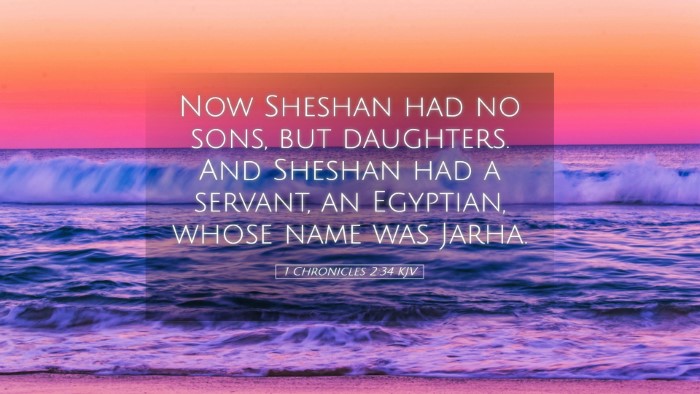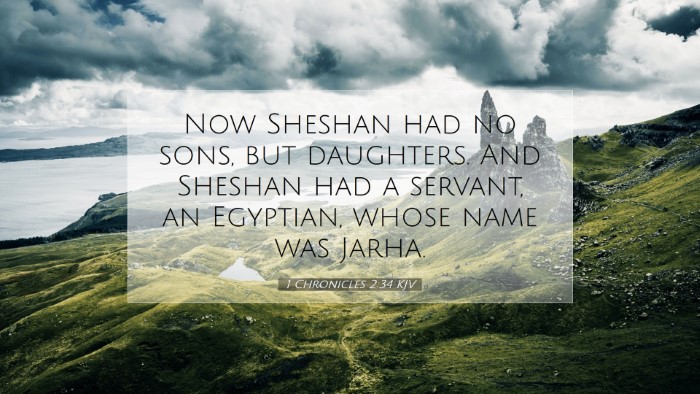Commentary on 1 Chronicles 2:34
Verse Reference: 1 Chronicles 2:34 - "And Sheshan had a daughter, and he gave her to a man of his servant to wife; and she bare him Attai."
Introduction
This verse is a part of the genealogical record found in 1 Chronicles, which emphasizes the lineage of key figures within Israel's history. In 1 Chronicles 2, the focus is on the descendants of Judah, the tribe from which the kingship would ultimately arise in Israel. Here, we find the mention of Sheshan, a lesser-known figure, and his daughter, whose marriage carries implications for future generations.
Analysis of Key Themes
Genealogy and Heritage
Public domain commentaries, notably that of Matthew Henry, highlight the significance of genealogy in the Jewish tradition. This verse serves to connect individual family lines to the larger narrative of Israel's heritage. The practice of recording lineage underscores God's faithfulness through generations and the continuity of His covenant people.
Marriage Practices in Ancient Israel
Albert Barnes provides insights into the customs surrounding marriage during this time period. The fact that Sheshan gave his daughter to one of his servants indicates a common practice of ensuring alliances and maintaining social hierarchies. This act could also signify trust and loyalty, as marrying one’s daughter to a servant suggests a relationship that goes beyond mere servitude.
Marital Alliances
The marriage mentioned in this verse aligns with the broader cultural norms where families sought to secure their status through marriage. The offspring, in this case, Attai, are critical for continuing the family line, which was of paramount importance in Israelite culture. Adam Clarke remarks that these alliances often had socio-political implications, affecting both local and tribal dynamics.
Significance of Attai
Attai, the child born from this union, plays a role in the ongoing narrative of the lineage of Judah. Matthew Henry points out that the mention of him symbolizes the continuation of a legacy that, although may seem minor in this brief mention, fulfills God’s overarching plan for Israel. Commentaries frequently emphasize the unpredictability of God’s choice in bringing forth key figures from unexpected places.
Divine Providence
Attai's existence illustrates a recurring biblical theme—God's providence in raising leaders from within seemingly ordinary circumstances. The Chronicles often highlight God's ability to work through individuals whose backgrounds may not suggest great significance. Albert Barnes notes that "even those who are obscure can be instruments in the hand of the Almighty for future purposes."
Lessons for Today
This verse has profound lessons for contemporary readers. In a church context, it emphasizes the value of every individual’s contribution to the community, irrespective of their background. Pastors and theologians can draw from Sheshan's actions to illustrate that the family is a primary context for discipleship and God’s redemptive work.
Trust and Relationships
Sheshan’s decision to entrust his daughter to a servant illustrates a principle of trust in relationships. Adam Clarke emphasizes how positive, trusting relationships are vital for community building within the church. This mirrors the relationship believers have with Christ as He entrusts His followers with responsibilities in His kingdom.
Faithfulness and Obedience
Moreover, this passage underscores the importance of obedience to God's will in our family decisions. Matthew Henry notes that Sheshan's actions reveal a commitment to honoring family ties and duties. In modern ministry and family contexts, this verse serves as a reminder of the importance of godly principles in marriage and family life.
Conclusion
While 1 Chronicles 2:34 may appear as a simple genealogical note, it encapsulates rich themes of ancestry, family, and God’s providence. This commentary synthesizes insights from various public domain authors to enhance understanding among pastors, students, and scholars. The legacy of Sheshan and his daughter resonates through generations, inviting reflection on the roles we play in the divine narrative.
May this understanding inspire deeper engagement with Scripture and reaffirm the belief that every person's story plays a crucial role in the unfolding of God's plan.


